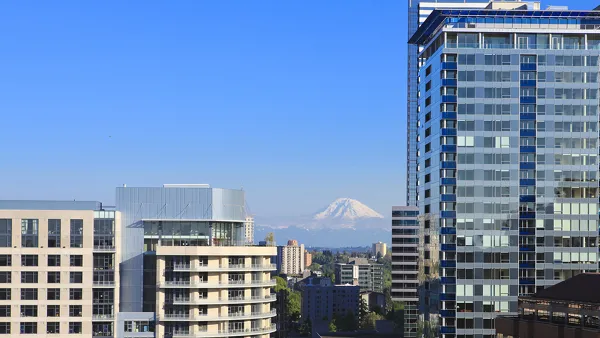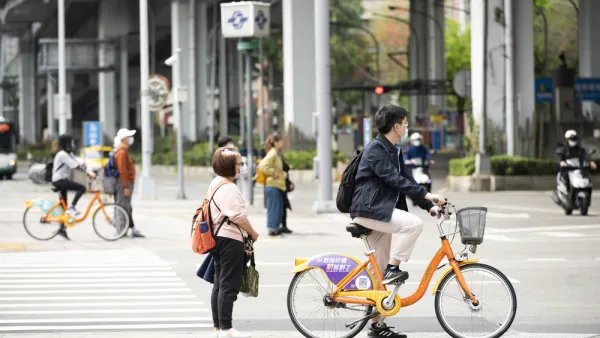If you forget to bring a bag, pay a dime for either a paper or reusable plastic bag. Single-use plastic bags will disappear from grocery stores and pharmacies on July 1, convenience and liquor stores a year later. A composting bill was also signed.
The plastic bag ban, the nation's first resulting from state legislation, is a result of Gov. Jerry Brown signing Sen. Alex Padilla's (D-San Fernando Valley) SB 270 on Sept. 30, the last day for him to sign or veto bills. The bill "set off one of the fiercest lobbying battles in the Capitol this year," write Patrick McGreevy and Melanie Mason of the Los Angeles Times.
In fact, as noted a month ago, the bill had died but was resurrected three days later after a union and grocery chain came to an agreement on how the bag revenue would be spent.
In his signing statement, Gov. Brown said, "This bill is a step in the right direction – it reduces the torrent of plastic polluting our beaches, parks and even the vast ocean itself. We’re the first to ban these bags, and we won’t be the last."
Indeed, Climate Progress reported in March on an attempt by New York City council members, not the first, to institute a city-wide ban. A coalition of groups has formed to advocate a ban.
New Yorkers currently throw away 5.2 billion plastic bags per year, which costs the city $10 million a year to transport the waste to landfills.
Chicago, Austin and Seattle already have such bans, reports The Associated Press. And contrary to some media headlines, including ours last month, Hawaii instituted a plastic bag ban two years earlier, as Stateline via Governing notes, though it was not the result of state legislation.
The Sacramento Bee reports that the plastics industry will attempt to reverse the legislation via a 2016 ballot measure.
Minutes after Brown announced signing the bill, an industry group called the American Progressive Bag Alliance vowed to begin collecting signatures in an effort to overturn the law via a referendum on the 2016 ballot. They filed a request for title and summary later in the day.
Another bill signed by Gov. Brown may have more impact, weight-wise, in reducing the state's waste that goes to landfills, though it has received scant media attention. AB 1826, by Assembly Member Wesley Chesbro (D-North Coast) "will require businesses to separate their food scraps and yard trimmings for composting or anaerobic digestion," according to Californians Against Waste
"This is huge news for California, and is expected to lead to major growth in the state’s composting and anaerobic digestion infrastructure," states Nick Lapis, their legislative coordinator.
“In fact, food is the most prevalent item in the disposed waste stream and over 40% of all material going to landfills is readily compostable or anaerobically digestible. This is simply unacceptable, and it is irresponsible of us to waste this valuable material.”
"AB 1826 will help the state meet its objective of recycling 75 percent of all waste by the year 2020, as established by AB 341, which Chesbro authored in 2011," states Chesbro's press release.
FULL STORY: Statewide ban on disposable plastic bags is signed into law by Brown

National Parks Layoffs Will Cause Communities to Lose Billions
Thousands of essential park workers were laid off this week, just before the busy spring break season.

Retro-silient?: America’s First “Eco-burb,” The Woodlands Turns 50
A master-planned community north of Houston offers lessons on green infrastructure and resilient design, but falls short of its founder’s lofty affordability and walkability goals.

Delivering for America Plan Will Downgrade Mail Service in at Least 49.5 Percent of Zip Codes
Republican and Democrat lawmakers criticize the plan for its disproportionate negative impact on rural communities.

Test News Post 1
This is a summary

Test News Headline 46
Test for the image on the front page.

Balancing Bombs and Butterflies: How the National Guard Protects a Rare Species
The National Guard at Fort Indiantown Gap uses GIS technology and land management strategies to balance military training with conservation efforts, ensuring the survival of the rare eastern regal fritillary butterfly.
Urban Design for Planners 1: Software Tools
This six-course series explores essential urban design concepts using open source software and equips planners with the tools they need to participate fully in the urban design process.
Planning for Universal Design
Learn the tools for implementing Universal Design in planning regulations.
EMC Planning Group, Inc.
Planetizen
Planetizen
Mpact (formerly Rail~Volution)
Great Falls Development Authority, Inc.
HUDs Office of Policy Development and Research
NYU Wagner Graduate School of Public Service




























